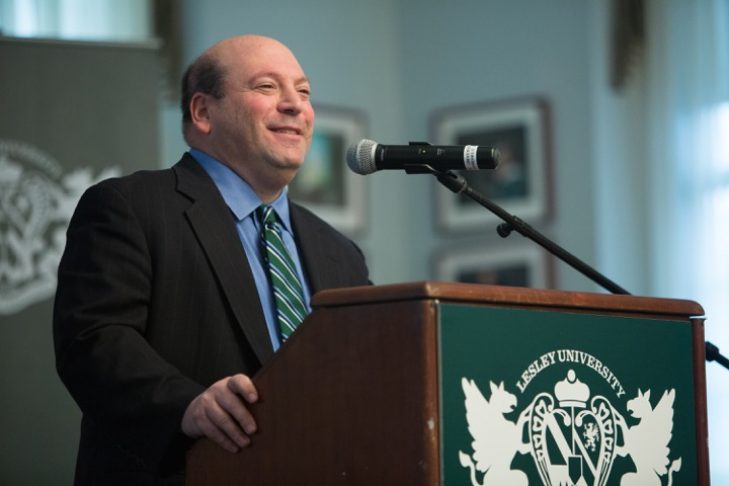Newly installed Lesley University president Jeff Weiss recently spoke to JewishBoston about his unique background and his goal to build on the university’s mission of social justice.
Do you agree that your career path leading to the presidency of Lesley University has been unique?
It’s a different career path than many take to become college presidents. My career has been spent primarily building entrepreneurial firms and programs to help people manage partnerships, negotiate complex things and resolve conflict. My work over three decades at Vantage Partners—and at a nonprofit and Harvard Law School before that—was focused on driving change, transforming organizations and helping people work and operate in new and different ways together.
I’ve also been a long-time faculty member at the Tuck School of Business at Dartmouth College, where I taught negotiation to MBA candidates. I also taught in the master of health care delivery science program to help health care executives work in a complex environment where they need to get things done working with other people.
The other piece of my career was working at the United States Military Academy at West Point for many years. I was an active volunteer and lectured in the War College many times. I worked in the Navy SEAL training center and with U.S. Army Special Forces on complex issues of peacekeeping and stability operations. That’s the kind of social justice piece that is so critical to us at Lesley.
What attracted you to Lesley University?
One of the key things that brought me to Lesley was its commitment to social justice. I am highly committed to a continuation of that mission. We’re not only training future leaders who will have an impact on social justice, but we’re also allowing them experiences while at Lesley where they have an opportunity to influence outcomes. That can include making an impact on issues of poverty, education or ecology and the environment. The kinds of complex problems we work on at Lesley have to do with the core of social justice.
Who is your Jewish community?
We’ve been members of Temple Emanuel in Andover for as long as I can remember. My family joined the Reform temple in 1977, and my wife has been an officer there for a long time. She’s currently serving her second term as president of the congregation. While I get spiritual fulfillment from attending services, as well as from rituals, Judaism for me is also about being a good person, a whole person, whose mind and body is fulfilled. It’s about giving back. It’s about knowing what happens in history when you can’t manage conflict and differences—the horrendous implications of that and being able to find creative solutions. For me those values are the most critical and keep me connected to my Judaism.
Did growing up in the Boston area impact your views on education?
I went to school during a complex time—a time that was incredibly awful in the history of a city I care deeply about. My grandfather was born here and my two sons were born here. I grew up during desegregation, and it was a time right in the midst of Vietnam, in the midst of a lot of social change and violence in our country. I learned that hatred, violence and a lack of understanding can destroy lives and a sense of self. It’s not a surprise that I ended up in conflict resolution.
I was also blessed to grow up with Sam Turner, the first African-American principal in Newton. Sam taught me tremendous things about appreciation, listening and understanding, even at a young age. That experience strongly influenced my desire to be in education, to be a consultant in the negotiation and collaboration-partnering realm and to teach at West Point. I also realized the need to ask questions, listen and explore with real and genuine interest. I grew up in a time when conflict wasn’t really resolved in a healthy way, at least around the issues of desegregation, for a long time.
How has your career in conflict influenced your life?
It has been the leitmotif of my career and life. I was blessed to have Roger Fisher, a professor at Harvard Law School for most of his career, as my mentor. We lost Roger a couple of years ago, but he taught me and multiple generations a couple of key things, which are critical in the role I play now. One is that the world is a complex place full of conflict. Conflict can be a good thing if people appreciate differences and if they aim to explore and understand those differences in order to leverage creative problem-solving. If you can do that in a skillful way, you can do amazing things. At one time my colleagues worked with Nelson Mandela on post-apartheid constitutional reform, as well as on multiple projects between Israelis and Palestinians.
The second piece is a value that connects to my Judaism. Those of us who have been blessed with wonderful stability in life, a wonderful education and supportive family and friends, should be giving something back to help people. For me, it was through conflict resolution and helping with partnerships. That’s a large part of why I switched careers to come to Lesley, which has been committed to social justice for almost 110 years.
This post has been contributed by a third party. The opinions, facts and any media content are presented solely by the author, and JewishBoston assumes no responsibility for them. Want to add your voice to the conversation? Publish your own post here. MORE



